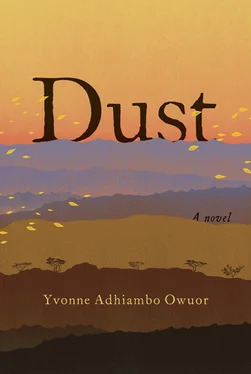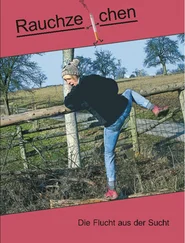The room is stifling.
He slams her door in error.
Retreating footsteps. A wondering. What if every human is born with a volume of madness to resolve? Isaiah hunts for and retrieves his keys. Some seize and drive those forces into an inner corral . He enters his room. Others are overwhelmed; they submerge and quietly drown . He locks the door behind him.
Good evening, Jos .
Evening, ma’am .
He is there, head bowed, as though in prayer.
She will color absence green.
Like grass and life.
His shirt.
Black skies outside.
Rain scatters on the red brick ledge.
Ajany studies raindrops. That way she can postpone meeting Isaiah. There, the salve: washing blood from jagged wounds. Here, the waterfall: tumbling into fire, becoming steam, and returning as rain again. Suddenly, next to her, a pointy-nosed waiter says, “Madam, Calisto the chef recommends chicken tikka masala with a choice of potatoes, ugali, chapati, or rice.” The waiter escorts her to a chair opposite Isaiah.
Not a green shirt, more like a shade of teal.
Eyes lowered, Isaiah suggests, “Chicken?”
A nod.
She counts the bamboo-wood strips of her place mat. Outside, quiet rain. He lifts his head. Between them, magnetic tension, and Isaiah’s contemplation of Ajany becomes an incendiary thing. Drawn to look, she finds his voracious, restive longing. Its confusion. Blinded, she allows his hunger, revealing her own, breathing through half-open lips. Suspended seconds, soft fall of rain. On the table with its plain white cloth, fingertips touch. Stillness. Clanking plates on a tray. Footsteps. Curried steam. The food is served.
TWO NIGHTS AGO, HE MADE THE DECISION. NYIPIR HOVERED outside Galgalu’s boma , carrying a huge empty gunnysack. He needed Galgalu’s company. Bandaged and balmed, Galgalu had returned from the medical center the night before.
Nyipir told Galgalu, “There’s something in the red cave.”
“It’s forbidden,” Galgalu replied.
Nyipir said, “For that reason, we go.…”
Galgalu said, “It’s time?”
All the while, Galgalu had known.
They ventured into the twisted darkness, crawled on the ground until they reached a sliver of light. They paused before entering into the chamber of images, stories, and bones, on their knees like penitents. When they re-emerged, they were burdened and changed. Nyipir insisted on carrying Hugh’s bones alone.
Three white-tailed honeyguides listen to human songs of unraveling oaths. Galgalu still prays over an Englishman’s ghost, pleading for a truce, since they are all so far from home.

Nyipir completes a new cairn within forty-eight hours. In that time, he has talked, mostly to human bones in a gunnysack, until his tongue is swollen. Galgalu hears some of those words, their plea for mercy.
Nyipir spoke of an almost-teenage boy running from a psychotic uncle whose head he had split with a flying hoe, a teenage gravedigger with plans to head out to Burma to retrieve family ghosts.
He spoke to the bones and Galgalu, of Hugh. “I used to be a child.” Nyipir says, “Before I met a man who walked with power.”
“He took me for police training. ‘Can’t work with “bleddy” civilians,’ he said — remember? I fed and washed a grown man who could kill if he wanted to — and he did. But he showed me how not to be afraid. And work, always work with Bolton. Driving. Washing dishes, clothes. Polishing brass and boots. Fetch, carry, hunt, cook, guard, light fires, set plates, boil bathwater, and set up a safari camp, walk, hunt, talk, fight, listen. And tea. At ten and at four.
“We hunted men,” Nyipir adds.
The addiction.
“This kind of thing does not end right.”
Silence. Yet in Nyipir’s mind, turbulence. Scarred memories of a patriot with a wire around his scrotum that would be pulled at another man’s whim, for the sake of the nation. Rotting in state dungeons. Losing faith, in God, in men, in country.
He finally told Hugh, “I’ve lost her.” Defeat.
No, he had never imagined intimate casualties, had never thought his only son would die before him in these nameless wars.
The cairn is completed before midnight. It is straight on all angles at the base, and the stones chosen to create the ramparts are perfect. When it is done, Galgalu brings Nyipir a calabash of liquid. Honey wine had medicinal and purgative values.
Nyipir had lost his Kenya on July 5, 1969, in Nairobi, when Tom Mboya was assassinated. The murder was the culmination of fears, swirling rumors, the meaning of clandestine oaths that made the rest of the country enemy territory to be owned. It was the purpose of the silences that had started before.
Nyipir and a colleague, Mzomba, had been looking across the Jeevanjee Gardens and had paused when the report of something punched the air. Then silence. They started to walk in the direction of the noise. Twenty minutes later, a woman in a green dress, barefoot, carrying white shoes, raced past them. She was crying, a horrible sound that seemed to come from all around her, and from within her.
Ka-Sehmi. Mayieee! Gi-neeeee-go Mboya .
Mboya!
Nyipir’s body temperature had dropped.
Tom. Mboya .
His heart had slowed down, and he collapsed with his disintegrating national dreams.
Then.
It is a lie. Nobody would kill Tom. Nobody would dare kill Tom, because it means they would be willing to kill Kenya .
He started to stutter something.
Later, Mzomba lit a cigarette and offered it to Nyipir, who was on his knees and clinging to a telephone pillar.
This death created a fissure in the nation, as if it had split apart its own soul. The funeral cortège was more than two kilometers long. A wailing nation lined up on three hundred kilometers of road to touch the passing hearse. In the silence of everything else, in the farce of a trial, a man named Njenga, who had fired the gun, cried, Why pick on me? Why don’t you ask the big man? Before he could suggest much more, Njenga was hanged.
After Mboya, everything that could die in Kenya did, even schoolchildren standing in front of a hospital that the Leader of the Nation had come to open. A central province was emptied of a people who were renamed cockroaches and “beasts from the west.” But nobody would acknowledge the exiles or citizens who did not make it out of the province before they were destroyed. Oaths of profound silences — secret shots in a slithering civil war.
In time.
A train would stop at a lakeside town and offload men, women, and children. Displaced ghosts, now-in-between people. No words. Then one night a government man drove into town from Nairobi. He carried petri dishes of vibrio cholerae . He washed these in a water-supplying dam. Days later cholera danced violently across the landscape, dragging souls from that earth, pressing dessicated bodies deep under the earth.
No words.
Under the trance of fear, a nation hid from the world. Inside its doors ten thousand able-bodied citizens died in secret. Some were buried in prison sites, and others’ bones were dissolved in acid.
Nyipir knew.
He saw.
He did not speak.
He hoped it would end soon.
Just like the others who had also seen, he told no one.
A hundred, and then a hundred more, herded into holding houses.
Picked up — taken from homes, offloaded from saloon cars, hustled from offices, stopped on their way to somewhere else — prosecuted, and judged at night. Guilty, they were loaded onto the backs of lorries. And afterward, lime-sprinkled corpses were heaped in large holes dug into the grounds of appropriated farms. Washed in acid, covered with soil that became even more crimson, upon which new forests were planted.
Читать дальше












